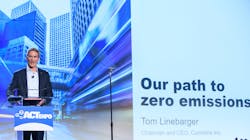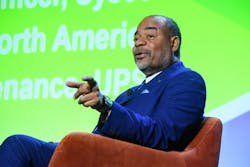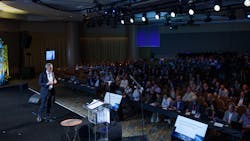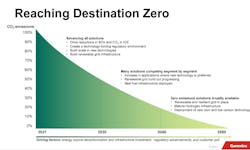Cummins CEO: Zero-emission future can be profitable for trucking
LONG BEACH, California—Creating zero-emission power technology isn’t just about ESG for Cummins—it’s about profits. The potential gains aren’t just for the iconic trucking industry power company that earned $2.1 billion last year: There are potential zero-emission profits to share.
“We actually think that we are going to grow and be more profitable because we’re leaning into decarbonization,” CEO Tom Linebarger told a crowd gathered for his keynote address on the final full day of the Advanced Clean Technology (ACT) Expo here. “We're going to lead—that's our goal. We are going to provide the solutions for you. We're going to find ways to solve these problems. And because we're going to do it better than other people, we’re going to end up growing and being profitable and sustainable as an organization.”
See also: Truck OEM execs talk EV charging infrastructure pain points
Linebarger said climate change is an existential crisis that requires the trucking industry to respond. “Cummins engines alone are a measurable part of carbon in the atmosphere, so to say that we have a role to play would be an understatement. We have to do things proactively to change the calculus—or we will have some very difficult explaining to do.”
While it might be challenging to convince investors that the heavy-equipment company needs to double spending (it spent $1.1 billion on research and technology in 2021) to meet its “Destination Zero” goal, Linebarger said he believes that reducing greenhouse gas emissions and supporting the transition to decarbonized power is the right strategy.
“The reason I think we’re going to win is because for 100 years, we’ve been forced to innovate in technologies and produce powertrain and engineered solutions to other things that are better than our customers can produce themselves,” he said. “We only succeed when there’s innovation to do—and now’s the time.”
Sharing ZE knowledge and profits
UPS Inc. has had an ambitious sustainability plan for a decade that reduced CO2 per package delivered by nearly 15% between 2010 and 2020, according to the parcel delivery company. According to Carlton Rose, president of global fleet maintenance at the LTL giant, his fleet jumped into the sustainability movement years ago to be part of the solution that is starting to materialize.
He struck a similar collaborative tone to Linebarger during an executive roundtable earlier during ACT Expo: “I’m proud to see that technology out there,” Rose said. “I know our team has worked with the OEMs to push them to get it available for everyone—because we didn’t just do this for UPS. We’ve done it for the industry.”
After more than a billion dollars in investments, more than 10% of the UPS fleet of 122,000 vehicles (No. 2 on the 2022 FleetOwner 500: For Hire) run on alternative fuels. The carrier has thousands more on order. “We don’t want to be selfish,” Rose said. “We know that scale drives down the cost for everybody, and that’s what we want. It also makes the reliability in the technology better.”
Rose said that UPS is never satisfied with its technology, pushing OEMs to continue improving efficiency and other solutions. “This is a team effort throughout this industry because if it’s not, this industry won’t go. UPS does not want to be selfish with our knowledge.”
Destination Zero: 2050
Like UPS and other trucking industry companies that sent their leaders to speak at the ACT Expo in Southern California this week, Cummins set a goal to become carbon neutral by 2050. “That’s a long time to get there,” Linebarger said. “If you only have one solution—if you’re a startup company—with a really good idea and you have one solution for one application, it’s going to be hard for a while.”
With nearly 60,000 global employees in 190 countries and territories, Cummins has the size and scale to shift toward decarbonization over the next couple of decades. “We think our company is going to have a lot of solutions. We’re going to keep selling internal combustion engines, generating money that can fund the R&D.”
Cummins’ strategy to reach Destination Zero will continue to focus on advancing all power solutions through the rest of this decade that can set up more specific solutions as each segment finds its preferred zero-emission technology—and the infrastructure to support it is strengthened. During ACT Expo, Cummins introduced the near-zero-emission X15N, a 15-liter natural gas engine.
The company projects that low- and zero-emission technology will be widely available by the 2040s, including hydrogen infrastructure to support long-haul fuel-cell applications. “So we are on the move with actual products,” Linebarger said, noting they cost much more than traditional powertrains. “But we are working on that, too. We will continue to invest in helping solve this problem.
“I really appreciate the efforts of everybody in this hall, all the technologies I saw, and the amount of innovation,” he said. “Let’s just face it, we have to move faster. So please bring along your friends, your relatives, and everybody else in this game. We have a lot of work to do so that we have the right things to say to our grandkids down the road.”
About the Author
Josh Fisher
Editor-in-Chief
Editor-in-Chief Josh Fisher has been with FleetOwner since 2017. He covers everything from modern fleet management to operational efficiency, artificial intelligence, autonomous trucking, alternative fuels and powertrains, regulations, and emerging transportation technology. Based in Maryland, he writes the Lane Shift Ahead column about the changing North American transportation landscape.




